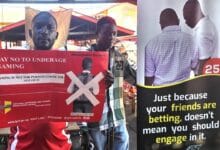Responsible Gaming in Uganda: NLGRB Calls for Responsibility in the Betting Industry

Betting and gaming have become an undeniable part of Uganda’s social and economic landscape. With the rapid growth of sports betting, online casinos, and lotteries, more Ugandans are engaging in gambling than ever before. While the sector contributes to employment and government revenue, it also poses serious risks, from addiction and financial loss to wider social harm.
On U24’s One-on-One Talk Show, host Sheila sat down with Denis Mudene Ngabirano, Chief Executive Officer of the National Lotteries and Gaming Regulatory Board (NLGRB), to explore what responsible gaming truly means, how it is regulated, and why the public must take it seriously.
The National Lotteries and Gaming Regulatory Board was established under the Lotteries and Gaming Act, CAP 334, with a clear mandate: to regulate the industry and protect the public. According to Denis, part of that responsibility is ensuring that gambling remains safe for individuals and communities. As he put it, “responsible gaming means a set of social initiatives focused on ensuring that people are safe, they gamble in a safe environment and they avoid the risks associated with gambling.” In practice, this translates into awareness campaigns, sensitization programs, and counseling services for those at risk of addiction.
Sheila pressed Denis on whether gaming should really be considered a “business.” He explained that from the regulator’s standpoint, it is: gaming is recognized as a legitimate enterprise in Uganda and is strictly licensed under the Lotteries and Gaming Act. But he was quick to stress that this applies only to operators. “To the operators, it is business,” he said. “But to the players, we are basically telling them to play responsibly, to only bet with what they can afford to lose. Gaming or gambling is simply a form of entertainment and it is not a money-making venture.”
Technology has reshaped Uganda’s gambling industry, with more than 90 percent of gaming now happening online. “Currently 93% of gaming in Uganda is online,” Ngabirano noted. “That clearly shows you that technology has evolved and it has not left gaming behind.” This shift has made betting more accessible than ever. Players no longer have to walk into a physical shop; with just a phone or a computer, anyone can place a bet instantly. While this convenience has fueled the industry’s rapid growth, it also raises new challenges, especially around accessibility for young people, the risk of impulsive gambling, and the difficulty of monitoring unlicensed operators.
To address these risks, the Board is working to ensure that the public knows how to distinguish legitimate companies from illegal ones.“For starters, anyone involved should get involved with a licensed company. If you want to check who is licensed, you can go to our website lgrb.go.ug. We have a list of companies that we have licensed. We also have a toll-free number, 0800 285800, if you really want to know who is licensed by the gaming board,” Denis noted.
Addiction remains one of the biggest concerns in Uganda’s gaming industry. To help players recognize risky behavior, the NLGRB has developed a self-check quiz with a few questions. These cover warning signs such as gambling to escape problems, chasing losses, lying about betting habits, or borrowing money to gamble. As Denis cautioned, “If you answer yes to five or more questions, you probably have a gambling problem.” Recognizing these patterns early, he added, is vital to keeping gaming as entertainment rather than falling into destructive behavior.
Beyond awareness, the Board requires licensed operators to provide “responsible gaming tools” that give players control over their habits. These safeguards include deposit and loss limits, time limits, and self-exclusion options that allow individuals to block themselves from platforms for a set period. “You can set limits by the amount you deposit… or the time you spend on these sites. If I lose this much in this period, then I am blocked for the next one, two, three weeks or a month,” Denis explained.
Such tools are already being embraced. Since the launch of the National Central Electronic Monitoring System, about 2,000 Ugandans have voluntarily self-excluded from gambling for weeks or even months. According to Denis, this is a positive sign of growing awareness and willingness among players to take control of their behavior before it spirals into harm.
He shared clear and practical advice for first-time gamers. Betting, he said, should always be treated as entertainment and never as a way to make money. He urged players to set clear limits on both time and money, avoid gambling under the influence of alcohol or drugs, and resist the temptation to play when stressed or lonely. Above all, only stake what you can afford to lose, and know when to walk away even if you are winning. As he emphasized, “This is purely a game of chance. You can win. You can lose. ”
Read Also: MAGLA Pumps K3O Million into 2025 Mount Mulanje Porter’s Race
Beyond regulation, the NLGRB has taken a proactive role in community sensitization. It has partnered with the Ministry of Health, Ministry of Education, Makerere University, and Uganda Police to run outreach campaigns in schools, markets, and villages. These initiatives not only raise awareness about responsible gaming but also address the social harm associated with addiction, including domestic violence. At the same time, the Board is cracking down on illegal operators. More than 6,000 unlicensed gaming machines, many disguised as simple coin slot devices, have been confiscated and destroyed.
The Ugandan law sets the minimum age for betting at 25. The rationale is that by this stage, most individuals have finished school, are employed, and can use their disposable income more responsibly. Responsible gaming, Ngabirano reminded Ugandans, is not about banning gambling altogether but about keeping it within safe boundaries. By setting limits, choosing licensed operators, and seeking help when needed, Ugandans can enjoy gaming as the entertainment it is meant to be. “This is not a business to a player,” he concluded. “It is simply entertainment. The way you go out and watch a match and be happy and go home, that is how people need to look at betting or gambling.”























